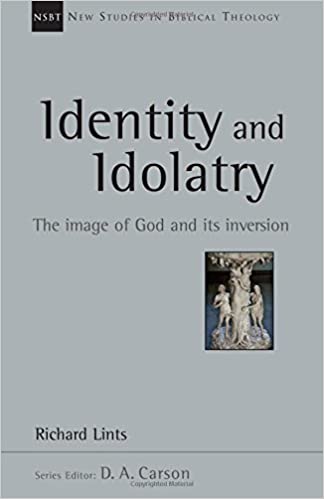A Book Review from Books At a Glance
by Steve West
About the Author
Richard Lints is a dean and professor at Gordon-Conwell Theological Seminary (Hamilton Campus). He has written a number of influential books on a variety of theological and philosophical themes.
Table of Contents
Chapter 1 Living Inside the Text: Canon and Creation
Chapter 2 A Strange Bridge: Connecting the Image and the Idol
Chapter 3 The Liturgy of Creation in the Cosmic Temple
Chapter 4 The Image of God in the Temple Walls
Chapter 5 Turning the Imago Dei Upside Down: Idolatry and the Prophetic Stance
Chapter 6 Inverting the Inversion: Idols and the Perfect Image in the New Testament
Chapter 7 The Rise of Suspicion: The Religious Criticism of Religion
Chapter 8 Significance and Security in a New Key
Review
Identity and Idolatry is an excellent book in an excellent series. It is Volume 36 in the New Studies in Biblical Theology series, and for those who have read other works in that collection, the general quality of every contribution speaks for itself. Lints’ volume is not inferior to any of its companion volumes; it is one of the best of the best. In his editor’s preface, D. A. Carson writes that “This book manages to blend some elements of systematic theology with careful biblical theology to produce a study that is wonderfully evocative.” Far from being a puff-piece or endorsement-out-of-duty, Carson’s claim is precisely right: this is a wonderfully evocative work.
Besides his theological competence, it can be added that when Lints deals with philosophical thinkers and trends, he is also very good at both grasping the significance of the thinkers he deals with (like Kant and Nietzsche), and in clearly communicating their major ideas. In neither his biblical theology nor his examination of Western philosophy does he make fiat connections or unguarded statements, and that is an extremely fine—and rare—accomplishment in its own right.
I honestly have a difficult time imagining the reader who would not learn a great deal from this book. Even where someone might quibble with a detail, the work is so rich that it helps generate all kinds of lines of fruitful reflection. Theological work on the imago Dei often extends far beyond the actual biblical data, molding the meaning of the “image and likeness of God” into a philosophical anthropology where the ontological features and faculties of human nature are analyzed to determine where and in what way it is that we are God’s image-bearers.
It is well known (but perhaps overdrawn) that many have identified the image of God with our ability to reason. There is also our moral responsibility or our souls which make us like God in some ways; likewise our ability to communicate. Others tend to incline towards interpreting the image of God in terms of relationships, or through the unity and differentiation of the sexes. Sometimes the metaphysical, the relational, and the functional aspects of humanity are played against each other, and other times there is more of an attempt at conceptual integration.
Lints is fully aware of these approaches and discussions, but he allows the biblical text (in its hermeneutical horizons) to set the agenda of the investigation. He listens and lets the Bible reveal the meaning of the imago Dei. Lints also—as the title of the book suggests—follows the Bible’s presentation of idolatry as an inversion of our image-bearing. God creates mankind in his own image, but rebellious sinners create and represent gods by idols and images. This is not only dishonoring to God, it is dehumanizing. It is ultimately in Jesus Christ, who is the perfect image of God, that humanity is restored and perfected.
One of the arguments in the book is that human beings must worship: we must reflect an image, as a mirror reflects an image. We are meant to reflect God, but the reflection we give of him is distorted. There is a God-given impulse and desire for something transcendent, and for security and significance. Because we have a broken relationship with God, we search for security and significance in idolatry, but this creates a downward spiral of greater and greater levels of insecurity and insignificance, which in turn makes us all the more desperate to create a god that we can worship. Idolatry is a matter of the sinful heart and disordered affections.
In many ways, this book is a model of succinct but deep biblical theology. It demonstrates responsible hermeneutics and exegesis while showing competence in systematic theology, philosophy, and historical/cultural knowledge. It also is highly applicable and practical for individuals, society, and the church. After all of these centuries of church history, it might seem like the topic of the imago Dei has been too well-worn to require a new discussion. One might even suspect that if there was a genuinely fresh study of this subject, it would likely have to push towards unorthodoxy to attract any attention.
This work by Lints avoids the many pitfalls that could attend publishing on this subject, and he gives us something which is enriching theologically and profoundly biblical. This is a very valuable contribution to the theological literature on the subject of the imago Dei, and reading it is both a thought-provoking and enjoyable experience.
Steve West is pastor of Madoc Baptist Church in Madoc, Ontario. He is also adjunct professor at Toronto Baptist Seminary and an assistant editor here at Books At a Glance.
